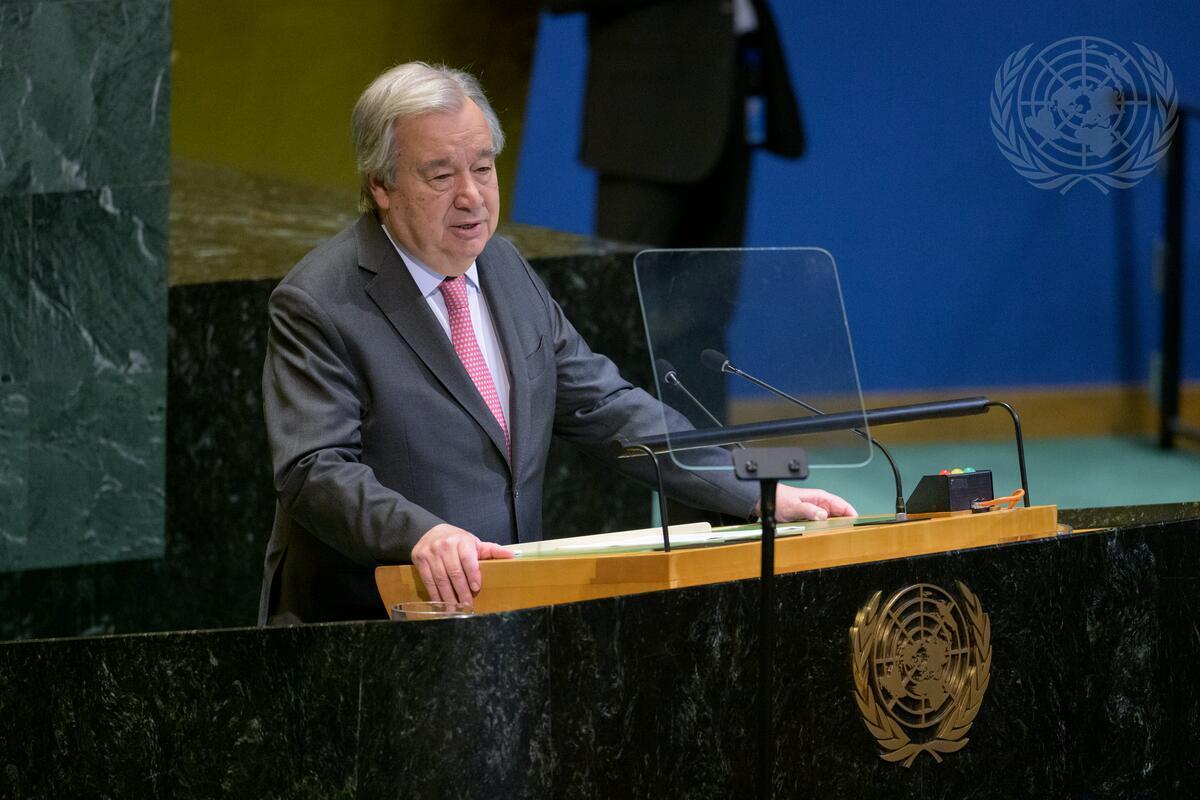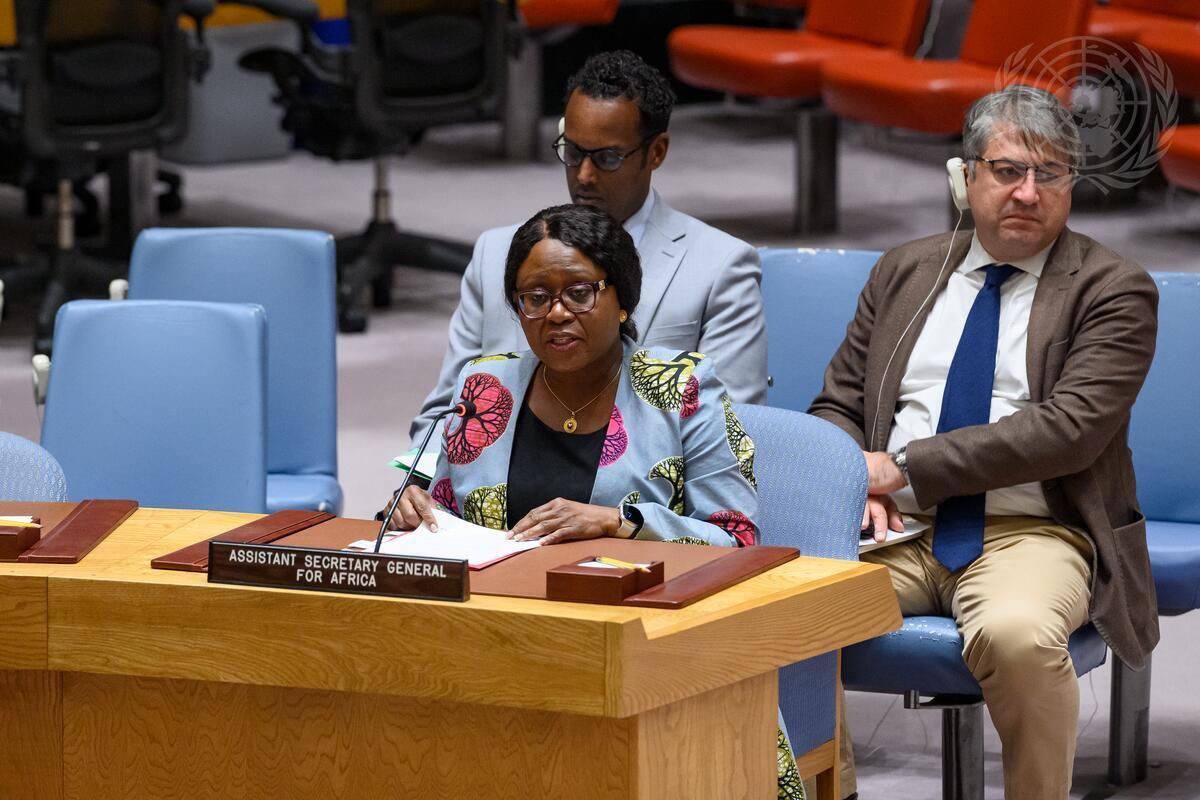Madam President
Thank you, Madam President, for the opportunity to brief the Security Council. It is my first briefing to this Council and I am grateful to the Secretary-General and also to the Council for the confidence they have placed in me.
I have been in Sudan for five weeks now and I have met with the transitional Government, with the Sovereignty Council, and listened to a wide range of stakeholders here, to their aspirations and the challenges that Sudan is facing. I am also constantly trying to explain what our mandate is, what the nature of our mission is.
And I continue to make clear that the four strategic objectives of our mandate – that is, support for the political transition, peace processes and the implementation of peace agreements, peacebuilding, and of course the mobilisation of external resources – that these are interdependent objectives. Progress on the political transition or peacebuilding will not happen without economic resources, and vice versa.
Madam President,
The political transition in Sudan is moving forward. Sudan’s Sovereignty Council was expanded to include three signatories to the Juba Peace Agreement and a new a cabinet has been formed under the leadership of Prime Minister Abdalla Hamdok.
The new cabinet has a distinctively political – as opposed to technocratic – character. It is a broad coalition built on power-sharing between civilians, the military, and armed movements. There are diverging views as to the capability of this government, and definitely the government does not include all political forces. However, the representation of different political currents and movements, with their respective constituencies, has already made it possible for this government to take and to implement even difficult decisions.
This new government has also been able to agree on five national priorities: the socio-economic conditions; implementing the Juba Peace Agreement and negotiations with the two non-signatories; security sector reform, protection of civilians; international relations; and advancing Sudan’s democratic transition.
At the same time, I have to say that important milestones foreseen in the Constitutional Document and the Juba Peace Agreement have yet to be reached, notably the formation of a Transitional Legislative Council with at least 40 per cent representation of women. The swift formation of an inclusive and representative Legislative Council is indeed critical to broaden the support for the political transition.
There are fears that the gains achieved for women’s rights in the Constitutional Document, such as the Gender Commission to be established, and the 40 per cent representation of women, might not be realised.
And Sudanese youth have also expressed frustration over their lack of representation. I can only underscore that an inclusive political process, including all segments of Sudan’s diverse society throughout the political transition, is essential for the success of this transition.
Madam President,
There has been progress on economic reform and Prime Minister Hamdok’s messages that Sudan is now becoming a country open for investment. The Government’s decision to float the exchange rate of the Sudanese currency was a courageous step that will unlock financial assistance, pave the way for debt relief and fostering private sector engagement. The Investors’ conference coming up in Paris in May can help mobilise private foreign investment, driving job creation and development
This said, we cannot ignore, though, that economic hardships are posing real risk to Sudan’s stability. Inflation stands at about 300 per cent in January. Sudan also suffers from large trade and financial fiscal deficits, high unemployment and poverty. 13.4 million people – that is a quarter of the country’s population - are in need of humanitarian assistance, including 2.5 million internally displaced. Sudan generously hosts 1 million refugees, including 70,000 recent arrivals from Ethiopia.
While the Government has launched the Family Support Program to ease the strain on large segments of the Sudanese population, the need for sustained financial and economic support to Sudan cannot be overstated and I therefore urge the international community to step up their assistance to Sudan.
Madam President,
The government of Sudan is giving high priority to advancing the peace process with the two non-signatories, the SPLM-North - Abdalaziz Al-Hilu and the SLM - Abdalwahid al-Nur faction. The recent meeting of the Chairman of the Sovereign Council, General Burhan, with Mr. Al-Hilu and the declaration of the latter Mr. Al-Hilu to unilaterally extend the cessation of hostilities are clear signs of a common interest in resuming the peace process.
I will continue to engage the parties to the peace process, and UNITAMS stands ready to assist ongoing efforts to realise a comprehensive peace settlement.
For us Madam President,
The protection of civilians is one of our main priorities. In January, and the Council had a session about that, intercommunal clashes in El Geneina, in West Darfur, left 165 persons dead and 100,000 displaced. Subsequent clashes in West Darfur and South Darfur underscore the risks of more intercommunal violence. The United Nations is working to support Sudanese government to strengthen the protection of civilians. The Minister of Interior and Head of the National Committee for the Protection of Civilians have requested the UN’s assistance to strengthen policing capacity and early warning and we are responding with technical advice and with capacity building.
Progress in the protection of civilians also requires strengthened legal frameworks for human rights and for the rule of law. I welcome Sudan’s recent decision to ratify the Convention against Torture and Other Cruel, Inhuman or Degrading Treatment or Punishment, as well as the International Convention for the Protection of All Persons from Enforced Disappearance. The Order from Sudan’s Attorney General prohibiting the arrest and detention by non-police forces is also a step in the right direction. Protecting the space for peaceful protests and for civic activity will remain critical.
And peace will only be sustainable if the root causes of the conflicts are addressed. The UN and its partners are implementing prevention and peacebuilding projects not only in Darfur but in Darfur and elsewhere, including projects started by UNAMID. UNMAS for example is now conducting demining in Darfur and the Blue Nile State in the aftermath of Juba Agreement.
UNITAMS is a small mission but a small mission with a broad mandate. Together with the UN country team, we are adopting an integrated approach to maximise our efforts and our resources. We will shortly be launching the Sudan Peacemaking, Peacebuilding and Stabilization Programme, which is a framework to jointly implement resolution 2524 and we are grateful to all the Member States who contributed and will contribute to the Peacebuilding and Stabilization Window of the Multi Partner Trust Fund.
Finally Madam President,
Turning to my regional engagement, I have had constructive first discussions with the African Union representative here on UN-AU cooperation and I will be briefing the African Union Peace and Security Council later this month. The increasingly complex geopolitical environment however is another challenge for Sudan, notably the tensions along the border with Ethiopia, intermittent clashes and heated rhetoric as well as reports of an intensification of military operations in the border region are deeply concerning. There is a serious risk here of miscalculation and escalation and it is imperative that the international community builds on Sudan’s and Ethiopia’s stated commitment for a diplomatic solution and that we support de-escalation and a peaceful resolution of this conflict.
In conclusion Madam President:
Let me say that Sudan is making significant advances in its transition. However, the remaining challenges are staggering. It is urgent to respond to the needs of communities across the country. UNITAMS, with an integrated country team, is committed to working closely with all components of the transitional authorities and other stakeholders in the country to address these challenges and help realise the aspirations of the Sudanese people. We are here for all of Sudan and I am confident that, with the unified support of this Council, we will be able to make a difference.
Thank you and of course I am prepared to answer questions.






